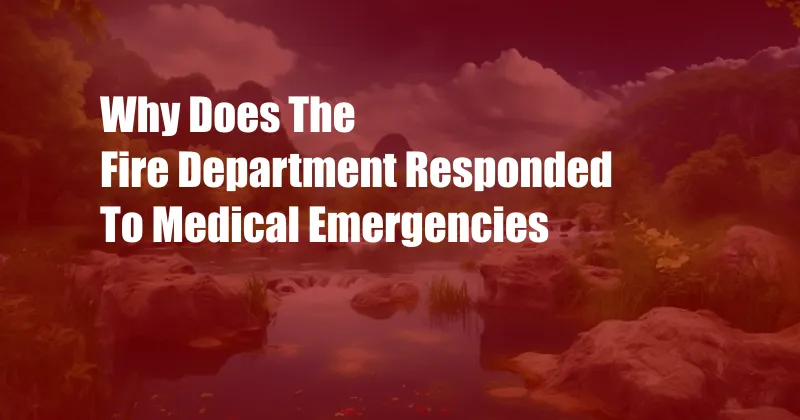
Why Do Fire Departments Respond to Medical Emergencies?
Imagine a frantic 911 call reporting an unresponsive individual. You’d expect an ambulance, right? Surprisingly, in many communities, the first responders are firefighters. This intriguing overlap sparks a natural question: why do fire departments respond to medical emergencies?
This practice stems from a historical and logistical trifecta: geography, training, and resources. Before the advent of specialized emergency medical services (EMS), firefighters were often the closest and quickest available help in an emergency.
Firefighters as First Responders
Historically, fire stations were strategically located throughout communities to ensure a prompt response to fires. This proximity made firefighters ideal first responders for other emergencies, including medical calls. With the rise of trained paramedics and EMTs, the role of firefighters in medical emergencies has evolved, but their presence remains crucial.
Medical Training and Skills
Firefighters undergo extensive medical training as part of their firefighting curriculum. They are proficient in basic life support (BLS), including CPR, defibrillation, and airway management. This training equips them to handle a wide range of medical emergencies, from cardiac arrest to trauma.
Equipment and Resources
Fire trucks are veritable medical clinics on wheels, equipped with vital life-saving equipment such as oxygen tanks, suction devices, and emergency medications. They also carry specialized equipment for extricating patients from vehicles or collapsed structures.
Benefits of Firefighter Response to Medical Emergencies
The presence of firefighters at medical emergencies offers several benefits. Their proximity ensures a rapid response time, minimizing the risk of further injury or deterioration in patient condition. Firefighters can also provide immediate medical attention before EMS arrives, potentially saving lives.
Firefighters’ training in structural collapse and hazardous materials handling is particularly valuable in medical emergencies involving these scenarios. They can assess the situation, rescue patients, and mitigate hazards to ensure the safety of all involved.
Tips for Interacting with Firefighter First Responders
- Remain calm and provide clear information about the emergency.
- Follow the instructions of the firefighters carefully.
- Stay out of the way to allow them to work effectively.
- If possible, provide any relevant medical history or allergies.
- Be patient and understanding, as they are often managing multiple emergencies simultaneously.
Remember that firefighters are trained professionals dedicated to saving lives. Their presence at medical emergencies is a vital resource for communities, providing quick and comprehensive care when it is needed most.
FAQs on Fire Department Response to Medical Emergencies
- Q: Why are firefighters trained in medical emergencies?
A: To provide immediate care in communities where EMS response time may be delayed. - Q: What types of medical emergencies do firefighters respond to?
A: A wide range, including cardiac arrest, trauma, and difficulty breathing. - Q: What equipment do fire trucks carry for medical emergencies?
A: Oxygen tanks, suction devices, emergency medications, and extrication tools. - Q: How can I interact effectively with firefighter first responders?
A: Remain calm, follow instructions, and provide relevant medical information.
Conclusion
The presence of fire departments at medical emergencies is an integral part of community safety. Their proximity, training, and resources make them vital first responders, providing immediate care and facilitating the transition to specialized EMS. By understanding the reasons behind this practice, we can appreciate the valuable role firefighters play in safeguarding our health and well-being.
Are you interested in learning more about the role of firefighters in medical emergencies?